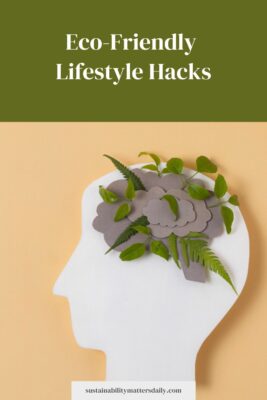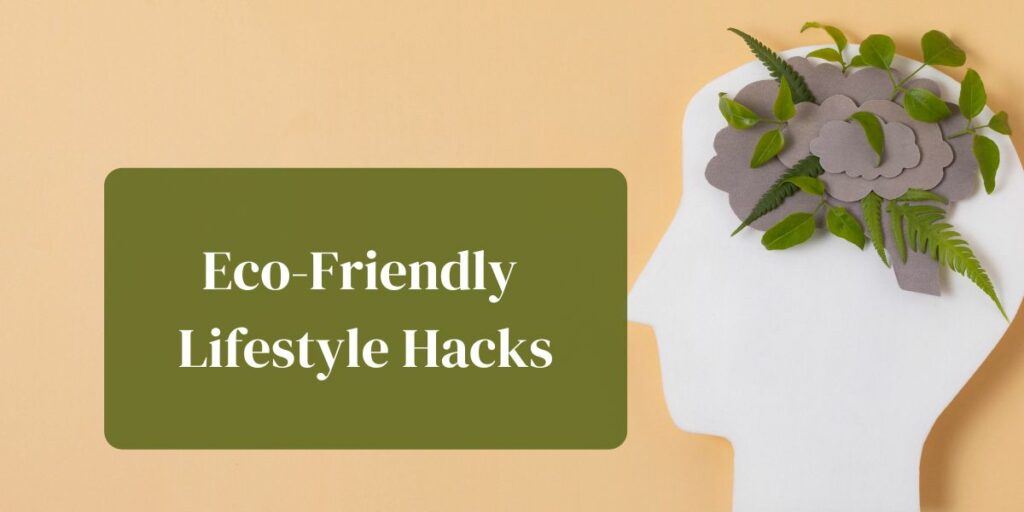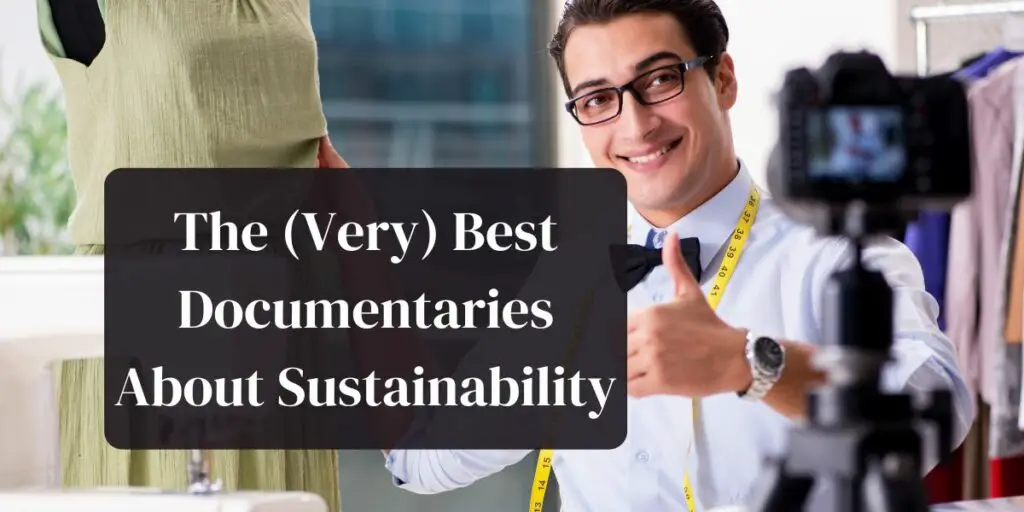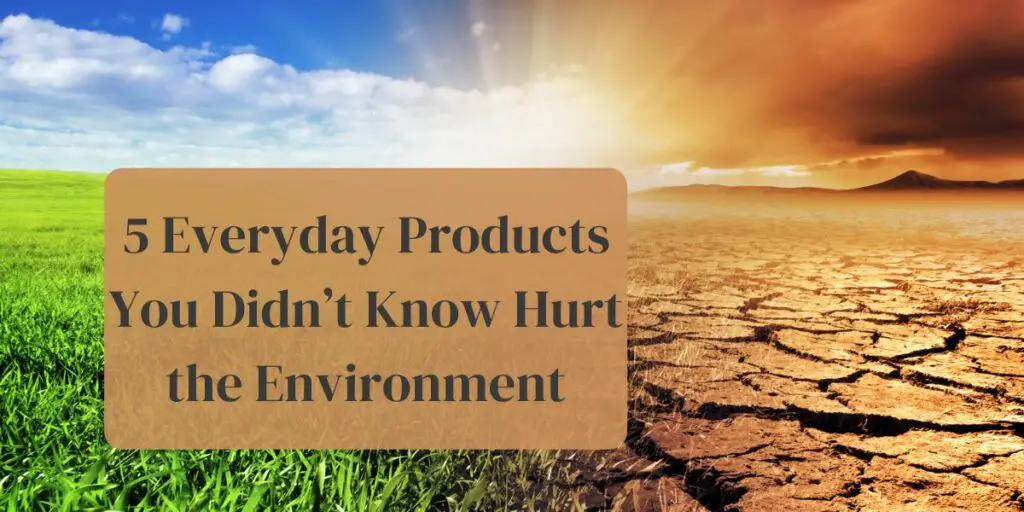Many people believe that living eco-friendly is something that will dramatically change their current lifestyle. But it doesn’t have to be like that. Changing small habits or buying some small environmentally friendly products can be more than enough. I have gone through quite a remarkable change myself over the last year and will share some hacks for leading an eco-friendly lifestyle.
I have changed my lifestyle quite a bit over the last years. There are many reasons for why I chose to live my life in a more eco-friendly way. Making this website was a huge part of it. However, seeing the rapid development in global warming made me even more worried about the way I was currently living.
In this article, I gathered some tips on how you can help the planet by choosing a different path in your daily life. In addition to that, I added some fun facts along the way…so you can actually learn something. 🙂

Table of Contents
- Products you should stop buying
- Products you should start buying
- Things you should either start or stop doing
- My story: how my lifestyle became more ecofriendly
- Conclusion
Products you should stop buying
There are certain products that you should stop buying in order to live a more eco-friendly lifestyle. You might be surprised at the huge environmental footprint some of these products leave.
Calculate your eco-footprint with these online calculators.
Beef
If you want to make a quick change that the environment absolutely will benefit from, start looking at what you eat. Your dinner is a great place to start becoming more eco-friendly. I have written a full blog post about how you can reduce your meat consumption, but I would like to start with some “fun facts” about the meat industry:
1. The beef livestock farming industry contributes to roughly 20 % of the total greenhouse gas emissions globally. That is more than the whole transportation sector (cars, buses, airplanes, trains, etc.) combined. Combined!
2. Beef is the most energy-intensive type of meat to produce. For each kilo beef produced, you need 25-kilo grain and 15,000 liters of water to feed the animal.
In comparison, 1-kilo chicken meat only requires 4000 liters of water – and pork would require 5900 liters.
You start to see why eating beef has a very negative impact on the environment..?
Wait, there is more!
3. Deforestation and land usage are other problems connected with the beef industry. About 30 % (!!!) of the earth’s land surface is used for livestock farming. This is a big factor to why Amazon disappears – bit by bit.
You see why people turn vegan now..?
New study shows: people do not care about climate changes when choosing their diet
It would be fair to make the assumption that people in developed, rich countries care most about the environment. Well, that will not be true if we believe the conclusion of a recent study from Norway. The conclusion was pretty clear: Norwegian people do not care about the environment when they choose what to eat.
Two scientists did a wide range of experiments and interviews in order to figure out how we choose what we eat. A part of the conclusion is that we do not have enough knowledge to distinguish good and bad. For example, most people are not aware of how horribly bad beef is for the environment. What is more worrying is that the consumer behavior did not seem to change despite getting more knowledge. Certain shops in Norway agreed to join an experiment where a brochure with information about the beef industry and its environmental impact was presented to people buying meat. Despite the fact that people were educated, they did not replace red meat with green vegetables (or white meat).
What does this study really show us?
That we are not going to see any significant change in people’s behavior unless we force them to do so. The plastic bag ban in Chile and Kenya is one example of forced government regulations that immediately makes a positive impact. If we put a tax on red meat to equal the environmental cost it has on the earth, people would probably eat less beef.
You can read the full study here if you want.
Cigarettes
Smoking does not only pollute the inside of your body. About 2 trillion cigarettes end up in
landfills around the world every year. Another 2 trillion will end up in nature – in lakes, forests, by pavements and forests. Despite being produced in a biodegradable material, it will still take up to three years for the cigarette butts to completely vanish.
Another environmental issue with the tobacco industry is the enormous carbon dioxide emissions produced every year. If governments around the world shut down the tobacco industry tomorrow, it would be the same as banning 16 million cars from driving on our roads.
Plastic water bottles
More than 1500 plastic bottles are being consumed in the US every second. Yes, you read that right. Second.
We also know that only about 15 % of all plastic items are being recycled, which creates a huge environmental problem. If you absolutely have to buy plastic bottles, please buy the bigger versions – and always recycle and/or reuse them by filling tap water into them. There is not a law saying that you can only use a plastic bottle once before throwing it away.
Frankly, it should be a law against it.
Also read: 5 ways companies try to reduce ocean plastic.
Products you should start buying
And then there are the things you should start buying to make your life more environmentally friendly.
PS! You don’t have to buy all of them at once, but if you start to buy at least one today, you can proudly say you have started on a journey to become more eco-friendly. That sounds pretty good, doesn’t it?
Microwave
Two big advantages of having a microwave:
1) 1000s of different dishes can be directly made without using much energy.
2) You can re-heat the dinner from yesterday instead of throwing it away.
It is not only energy efficient, but also contributes to reducing food waste.
Bamboo toothbrush
I know it’s a small thing, but with 800,000,000 plastic toothbrushes being disposed of annually in the USA alone, it makes a difference if we all start to use bamboo toothbrushes.
Feel free to read this post: My review of a bamboo (ecofriendly) toothbrush
It feels the same and costs (almost) the same as a “normal” toothbrush. And please buy them in bulk. Having only one toothbrush shipped from an Amazon warehouse to your home is not exactly the definition of eco-friendly buying…
Read our buying guide on bamboo underwear for men and bamboo underwear for women.
Things you should either start or stop doing
It does not only come down to the products you buy (or stop buying). It also comes down to your behavior. If you really are motivated to start living a more eco-friendly lifestyle, you probably need to stop doing some of the things you are currently doing.
These are some examples that are pretty easy to change without harming your life quality in any way.
Print less
We are luckily living in a time where most of what we will communicate or present to other people can go digitally. Try not to print out papers at work if you don’t have to. Buy a Kindle and start reading your books “online”.
And the newspaper that ends up on your doorstep every single morning…do you really need it?
Relevant environmental fact: 50 % of all waste coming from businesses and office buildings is paper.
Consume less and don’t buy “fast fashion”
Clothing companies want you to buy their products. And as they are operating in an extremely competitive market, they try to find creative ways to make your purchase more frequently than before. Look in your closet. The chances of you finding at least 5 pieces of clothing that you now considered “not trendy” or “not in any more” is quite high.
Only buy high-quality clothes that will last long. If you have to pay a bit more, so be it. It is better to purchase a t-shirt for 25 USD that will last three years than a 5 USD t-shirt that will be broken and/or not trendy within 4 months.
Relevant environmental fact: We are currently purchasing 400 % more clothing than we did only 20 years ago. This has a great impact on air pollution, increased landfills, water pollution in third world countries and soil toxicity.
Educate yourself
Pick up a book (or download it on a Kindle) about the environment. There are loads of books that can help you to live a more eco-friendly lifestyle. Topics that could be relevant:
1) What are the environmental issues need to take care of in the next 20 years?
2) How will the world look when we reach a high level of global warming?
3) How can I grow my own vegetables in my back garden?
……and so on.
There are loads of relevant books out there. If you want to get some book reviews, you can always head to our article about the top books about sustainability and the environment. I hate to brag, but we have put together a pretty good list of relevant books for people that want to increase their knowledge about this important topic.
Relevant environmental fact: It was even published a scientific report named “The Ideology of Climate Change Denial In The United States” by Collomb (2014). In the abstract, you can read that “The concerted effort to discredit the scientific consensus over man-made global warming has been continuing for two decades in the United States, and shows no sign of weakening. “
Read the full abstract here: https://journals.openedition.org/ejas/10305
Kind of sad.
Plant a tree
Do you have space around your house? Feel free to plant a tree or two. It will not only benefit the environment but also make your house a better place to live.
Relevant environmental fact: A tree will provide a habitat for wildlife. Don’t be surprised if you suddenly see more birds hanging around after your tree is starting to grow.
Do you want to know 5 things I’ve learned from forest bathing?
My story: how my lifestyle became more ecofriendly
As you already have seen in this article, I have done some investments in order to live a more environmentally friendly lifestyle over the last couple of years. And this is something that I will continue doing. I know that I won’t end up as the guy from the documentary “No Impact Man”. Living in today’s society and living a normal, social life will demand you to make some sort of environmental impact. But getting knowledge and being aware of what things that harm the environment is probably the most important thing to do.
Examples of how the ecofriendly initiative changed my lifestyle
I have taken some steps in order to implement some “rules” that I now live by. All of them are solely done to save the environment (do I sound like a hippie now..?).
Those are:
– If I got a choice, I will take the train instead of an airplane. When I lived in China, I sometimes traveled between Shanghai and Beijing. Despite the fact that the train trip took 6 hours and airplane barely 2 hours, I always chose the “high-speed train”.
– If I buy bottled water, I always make sure to buy the big bottles of 1.5 or 4 liters. Buying small 0.5 bottles make me feel that I almost buy more plastic than I buy water…
– I download more and more books on my Kindle. However, I have to admit that I really like laying in my bed or sitting by the fireplace reading a “proper” paper book. And I never buy any physical newspapers anymore.
– I almost get worried when I hear that people are going to travel to the other side of the world. From a conversation I had with some friends a while ago, I understood that it is now “normal” among certain Norwegian expats to take their work week in Shanghai and fly home every single weekend to see their families back in Oslo. Where most people would think about the stress that would cause for the people who were in the middle of that shift pattern, I could only think of the environmental impact it would have.
In addition to that, you seem like a quite strange individual if you in the middle of such a conversation scream out “do you really know how much the aviation industry pollutes!?”. ☺
– I try to eat less beef and more vegetables. If I am in a restaurant and got the choice between beef and some vegan/chicken dish, I am not in doubt anymore.
And these are just some of the adjustments I have made to live a more ecofriendly lifestyle. I do also buy less, but more expensive clothing. This is because I have seen a clear correlation between price and quality in the fashion industry. I try to use all electronic products until they are fully worn out…and so on. There are loads of small things that you can do in order to decrease your environmental impact.
When is the best time for dumpster diving? Read my guide.
Are there any downsides?
Well, I have to say that I sometimes worry a bit more. “Ignorance is bliss”, and most people today walk around in the society without trying to gain additional knowledge about the current environmental issues. That can be a nice thing for a short period of time. But I feel that I am now worried when I read headlines such as:
– “Flight company X will open a new route between Bangkok and Los Angeles”
– “This hamburger from restaurant chain X is more popular than ever!”
– “Beijing air pollution reaches an all-time high!”
– And so on…
These are actually things that I walk around thinking about. When I see a restaurant chain being opened, I silently think:
“Why don’t they just focus on producing food that actually will be healthy for humans and the environment?”
That being said, this is not an excuse for buying fast-fashion products, eating beef five times a week and buy new plastic bags every day. Everyone can and should contribute to make the world a better place. And the first step is very often the hardest and most important one.
Conclusion
As you already might see, there are loads of small hacks you can do to start leading an eco-friendly lifestyle. I know that there might be elements in this article that will change your life dramatically. Like, stop eating hamburgers. Or planting a tree outside your house. But if you slowly start by investing in a couple of eco-friendly products and take it from there, you have already started.
One thing will very often lead to another. And before you know it, you are sitting on the balcony next to your beautiful tree, eating microwave-heated leftovers while reading a book about sustainability on your Kindle. That should be your target! 🙂



Best thing you can do is becoming a leading politician in the world. Living an eco-friendly lifestyle is not only great for the environment, but it is not enough. It might give a great signal to your neighbors to get a solar panel installed on the top of your roof or anything. And it might be great to buy organic cotton t-shirts over “bad cotton” t-shirts.
However, you need to have a voice in the global political landscape if you want to change anything. Tax on meat, less air pollution, a total ban on single-use plastic items, etc.
This is where the big change is going to happen. Not that someone “runs an eco-friendly lifestyle”